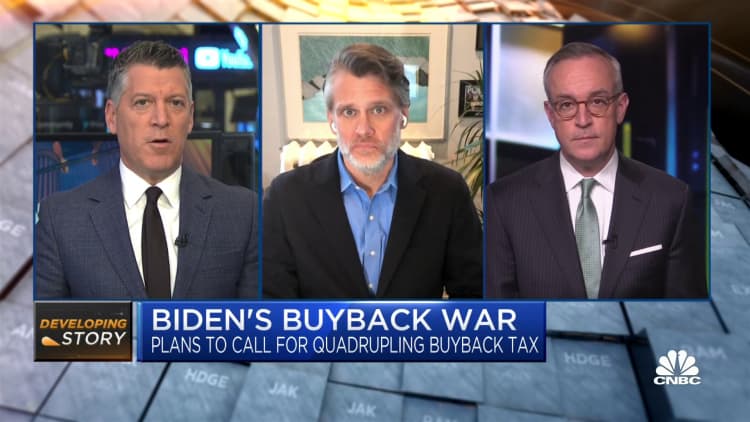Companies have been vocal about stock buyback authorizations during earnings season, from Chevron to ExxonMobil and Meta Platforms, and in the case of the first two, President Joe Biden's White House has been vocal about criticizing this use of market profits. But the increased corporate buyback activity is the proof of what many expected when the 1% tax on stock buybacks was passed as part of a major Biden legislative win in August 2022: it wouldn't do much, if anything, to deter buybacks.
In his State of the Union address on Tuesday night Biden called for a quadrupling in the buyback tax, and singled out oil companies. While he didn't provide details on a new tax proposal, a quadrupling could take the tax from 1% tax to 4%, and the White House could push for the tax to be gross rather than net of any shares issued for employee pay and M&A. It's part of a call for higher taxes on corporations and the wealthy which was featured as part of Biden's overall message to the nation.
But the legislative prospects have worsened, with the Republican Party now in control of the House. Given the recent history of this political effort — to pass the initial buyback tax and secure the vote of now-independent Kyrsten Sinema, Democrats had to cut that proposed tax rate in half from 2% to 1% — an increase to 4%, and a push to make the tax gross rather than net, could prove to be a better talking point for the president than legislative aim in the short-term.

When the original tax was passed, supporters and critics of the idea agreed on one thing: a 1% tax would do little to deter companies from repurchasing shares, but it was necessary as a starting point for Democrats to try to increase the tax from there. You get the tax on the books, and then you go back for more.
Record oil profits, but nobody close to Apple buybacks
ExxonMobil and Chevron first attracted the attention with recent earnings, record levels for oil companies boosted by high gas prices for much of last year, and bigger buyback plans, but they have been consistent targets of Democratic Party talking points for years. Even facing weaker operating performance and large cost cuts, Meta is sticking with its $40 billion-plus buybacks annual pace. And no company comes close to Apple, which was near $90 billion in fiscal 2022 stock buybacks — in its most recent quarterly earnings, buybacks came in just under $20 billion. Chevron's $75 billion buyback authorization is expected to be spread over as many as five years, and while second only to Apple in total authorization, may work out to roughly 4% of shares repurchased annually, which is a typical amount (about 20% of companies in the S&P 500 who buy back shares run at that level, according to S&P Global).
But in one important way, market leadership in buybacks is changing back to energy. That used to be the norm in a pre-Apple buyback world, with ExxonMobil the serial repurchaser of shares — at one point, it bought back shares in 39 out of 40 consecutive quarters (the only one it missed was during the acquisition of Mobil when it couldn't repurchase), according to S&P Global.
In Q3, the energy sector did $22 billion in buybacks, up from $3 billion in Q3 2021. "Enormous," was the way Howard Silverblatt, senior index analyst at S&P Global, referred to energy's rebound in the buybacks equation. In Q3 2020, during the Covid peak, the energy sector bought back $66 million — an "m" not a "b" — in shares.
ExxonMobil and Chevon have been accelerating their programs rapidly — Exxon to $4.5 billion in Q3 2022, over double what it had been two quarters prior ($2 billion), and up to $15 billion in Q4. It also outlined plans for up to $25 billion in buybacks over the next two years. Chevron came in at $3.7 billion in Q3, compared to $1.7 billion in the second quarter, and up to a $15 billion annual run rate by Q4. "This is a changing situation," Silverblatt said.
Banks' recent profile in share repurchases has waned
Who is energy taking leadership from? According to S&P, it's mostly cutting into financials right now.
Banks completed $23 billion in buybacks in Q3, compared to energy's $22 billion. But in 2021, banks completed $61.9 billion in third quarter buybacks. That had banks close to the tech sector, which was at $66 billion, but the calculus has changed for financials in a weaker economy and higher interest rate environment.
"When you have to make a decision, you protect the dividend," Silverblatt said.
Through complete third quarter 2022 data, it's still tech that dominates in buybacks.
Investors might be positioned in this debate by focusing on the balance sheet trends rather than political winds, and the companies that are posting the financial results to support an increasing level of buybacks. Meta's share price may have dropped a lot in the past year, but doing the same level of buybacks now with a weaker operating profile and increased expenses should attract investor scrutiny, said Vince Chen, director of research and investment strategies at FCF Advisors, which focuses on screening companies based on strength of free cash flow.
"Investors who care about cash return and shareholder value should care about operating results and doing buybacks with increased cash flow and EPS," Chen said. "And that's what we learn from investors placing focus more on energy companies posting good results."
But investors also shouldn't assume that increased buybacks will increase short-term stock performance. Among energy stocks in Russell 3000 Index, 38 out of 105 (36.2%) reduced their share counts year-over-year as of the end of 2022, up from 10 out of 98 (10.2%) at the end of 2021. Despite the uptick in the number of energy firms doing buybacks, the group underperformed in 2022 as opposed to strong performance in 2021. The average energy stock was up 60% last year, while the average energy stock doing buybacks up 44%. Long-term, it does matter. From 1996-2022, energy companies doing buybacks backed by strong free cash flow returned 13.88%, versus 7.99% for the average energy stock.
Wall Street, not surprisingly, is attuned to the change to more buybacks from cash-rich oil companies: On the recent Chevron earnings call, the buyback plan was a major line of questioning – there were 12 analysts on the call — five asked about various aspects of the buyback.
The oil companies, along with Wall Street, seemed to shrug at the White House attacks.
Chevron CEO Michael Wirth told analysts, "In terms of the reaction to it, I think it's perhaps been a touch overblown given that it's an open-ended program, and we could have sized a smaller one and just been prepared to do another one sooner," Wirth said. "We just looked at something that would last over a number of years, and we weren't trying to be splashy when we're trying to create any reaction out there. We're just trying to indicate the confidence we have in our cash generation."
That came in response to a question on its earnings call from long-time energy analyst Paul Sankey about the potential political repercussions, and Sankey later wrote in a note to his clients, "I would be absolutely certain many in the White House own Chevron stock in their 401ks. In DC, it is clear that politicians have no comprehension of 1) what a buyback is and 2) how many Americans own stocks in their pension funds/401ks." He added, "The tone of Mike's delivery, and he is a relaxed and confident guy, indicated that they were not really considering Washington, D.C."
A 1% tax remains far too low
If nothing more substantial, all the political rhetoric in response to rising buybacks makes clear how little the buybacks tax, as it stands, is making a difference. The 1% tax remains far too low to enter the calculus for many companies.
In its rough math on the Chevron example, S&P Global estimates that the 1% tax, on a net basis, would be cut by roughly half of a percent based on how the rule takes employee options-based stock repurchases into account for tax relief. The government will need to get to at least 2% or higher to get companies' attention on the buyback question, Silverblatt said. It's a lot easier to make a tax of 1% or less work on buybacks, especially since unlike dividends, they are not a "forever" mandate.
"Buybacks, there is a way to turn on and off. Cutting a dividend is the kiss of death," he said.
One Chevron analyst said that despite all the attention to the headline number in the Chevron buyback plan, the 4% share count reduction that is a rough estimate of its annual pace is really just Chevron doing the financial blocking and tackling it needs to do.
"This is not a soap opera. … I think it signals confidence in the medium-term outlook. If companies are not prepared to buy back meaningful amounts of their shares, why should investors buy them?" RBC Capital Markets energy analyst Biraj Borkhataria wrote in an email.
The politics of the buyback are just getting started
Where there has been a bit of a soap opera, some twists and turns on the way to the 1% tax, was on Capitol Hill. In September 2021, Sen. Sherrod Brown (D-Ohio) and Sen. Ron Wyden (D-Oregon) proposed that stock buybacks should be taxed at 2%. According to long-time buybacks critic William Lazonick, president of The Academic-Industry Research Network and University of Massachusetts professor of economics emeritus, the White House dropped that to 1% amid "the predictable business blowback about how even a small tax on buybacks would mean the end of the stock-market boom."
In August 2022, Democrats ended up including the 1% tax on buybacks in the Inflation Reduction Act as a concession to secure the vote of Sen. Kyrsten Sinema (D-AZ), which was needed to pass the Act in the Senate, in exchange for dropping the "carried interest" income tax loophole used by hedge funds.
Lazonick, who thought any minor buyback tax would be ineffective, says he has been proven correct on that point. "Despite good intentions ... whether at two or one percent, these surcharge proposals only serve to legitimize buybacks, and the tax revenue raised from them would come nowhere near to offsetting the immense damage to the U.S. economy and U.S. households that buybacks cause," he has written in a forthcoming publication for Cambridge University Press which he shared with CNBC.
Senate Majority Leader Chuck Schumer (D-NY) said in August 2022, "I hate stock buybacks. I think they are one of the most self-serving things that corporate America does. Instead of investing in workers and in training and in research and in equipment, they don't do a thing to make their company better and they artificially raise the stock price by just reducing the number of shares. They're despicable. I'd like to abolish them."
While Senator Wyden has been a supporter of some corporate tax priorities, including immediate R&D tax expensing that didn't get extended in December and was a "major blow" to corporations, his message on buybacks at CNBC's CFO Council Summit in Washington, D.C., last November was more moderately framed than Schumer's, if in general alignment. "We've had record amounts of buybacks, and look, we want to encourage investments and when companies are investing in new equipment and people and training and the like, we want to reward that, but if what they're doing is using these breaks they've got in order to enrich a small number of investors, that's not an example of economics that gives everyone in America the chance to get ahead."
The response from CFOs in attendance? One was blunt: "Who says we're not doing that?" Which got no direct response from Wyden. Other CFOs were closer to Sankey's view. Either Wyden was pretending he didn't understand buybacks, or maybe he really doesn't. Wyden put out a release after Chevron's buyback announcement, saying, "This is exactly why Democrats passed legislation I wrote with Senator Brown in the Inflation Reduction Act creating a one percent excise tax on corporate stock buybacks. Given today's news Congress clearly needs to go further."
Wyden now wants a 25% tax on "Big Oil" buybacks specifically.
While a 1% tax on buybacks has had little effect, Jesse Fried, a Harvard Law School professor who has written extensively on his opposition to the buyback tax, anticipated since August that "Congress will be tempted to hike the tax because many in the Democratic Party have convinced themselves that buybacks are evil," as he wrote in the Wall Street Journal.
Now Fried says we still can't know for sure at what level the buyback tax will influence corporate behavior, but there will be a point of no return and it does not need to be that much higher. "I know that at some point a buyback tax will materially affect the level of buybacks in the economy. I'm just not sure where that point is. Maybe 2% is not enough," he wrote in an email on Tuesday.
At any level, he says, "I think they are dead wrong."
He laid out many of his arguments in the Harvard Business Review, including the fact that there has been no shortage of cash on the corporate balance sheet in recent years, trillions, to suggest money going to buybacks was at the expense of other investments. "Hiking the tax would bottle up capital in companies, lead to higher CEO pay, hurt employees of tech companies (who are paid heavily with equity repurchased by companies), harm shareholders, and ultimately, reduce hiring and innovation in the economy," he said.
Fried doesn't see Congress hiking the buyback tax now that the Republicans control the House, but as the battle over buybacks continues, he says it is troubling to see Biden even proposing this tax increase.
If a higher buyback tax is enacted, he is betting it will not have the outcomes that Democrats envision. As long as it remains a tax on net buybacks (buybacks less issuances), "in a given year, as the tax rises we are likely to see companies deliberately timing buybacks so that they fall in years where there are issuances. To the extent issuances offset the repurchases, the tax becomes zero."
When members of the CNBC CFO Council were asked about the original 2% tax proposal in 2021, over half (55%) of U.S. CFOs surveyed said it would cause their company to buy back less of their own shares, while 40% of U.S. CFOs say that such a tax would have "no impact" on their buyback plans.
Silverblatt said total buyback announcements for Q1 2023 should surpass Q4 2022, which were estimated at $221 billion. "Companies have been vocal about authorizations (with META and CVX headlines), but authorizations don't always translate into actual buys," he added as a note of caution.
A 4% tax would increase government revenue more than 1%, but Lazonick said using buybacks to generate revenue "is very bad policy," especially for a president who as vice president was a major critic of buybacks, saying that the future of our economy depended on bringing them under control. "The starting point should be Sen Tammy Baldwin's Reward Work Act, introduced in 2018 and 2019, which would rescind SEC Rule 10b-18, thus exposing companies that are doing large-scale repurchases to stock-price manipulation charges," he said. "Buybacks should be banned."
While it's hard to see a higher tax getting passed in the current Congress, let alone an outright ban, it does make sense for Biden to state his desire for a quadrupling of the tax. "That keeps it in the news and most likely would be on his platform for a 2024 run," Silverblatt said. And according to his math, the tax would not have to get all the way to 4% to make a difference.
"My back-of-the-envelope estimate is that a 2.50%-2.75% tax ... could start to move money from buybacks to dividends, but not on a dollar for dollar basis," he said. If the tax was changed to gross buybacks from net, the impact would be even more significant. "Buybacks can be easily changed on a moment's notice, compared to dividends which are a pure-cash flow commitment, so I would expect less of a forward commitment to dividends from buybacks."
Changing a buyback tax, though, might first prove harder.






